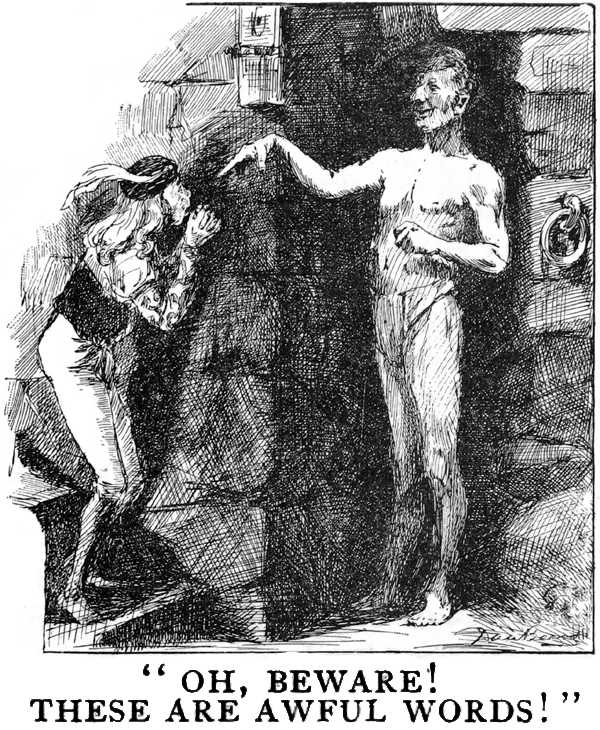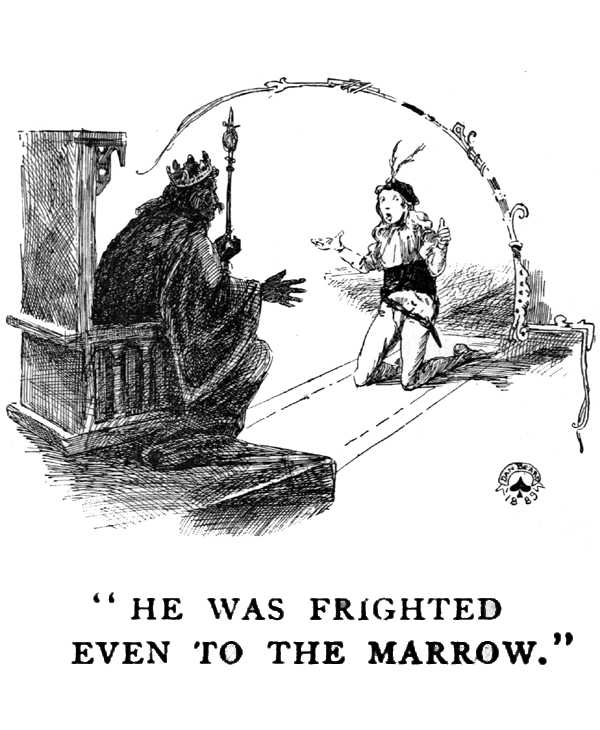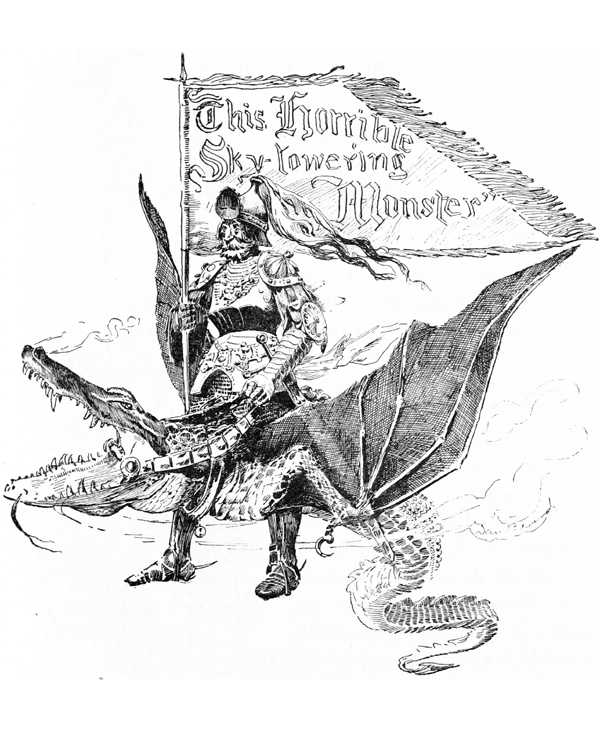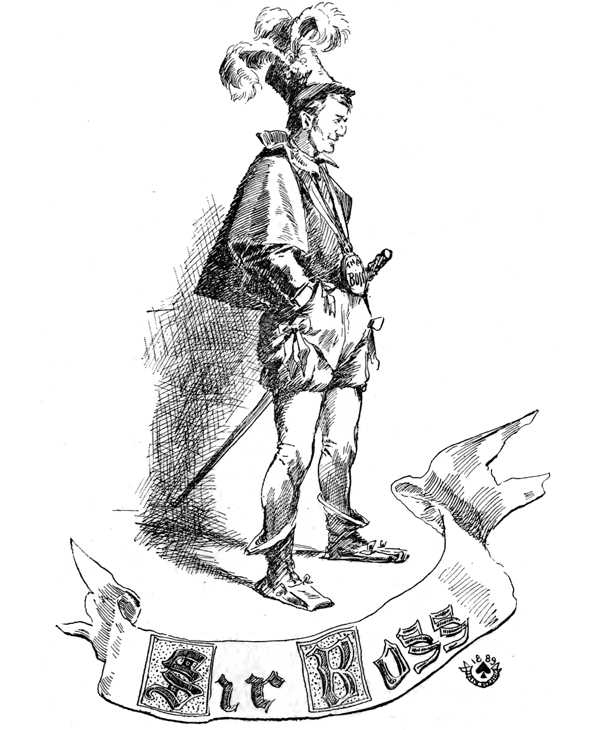A Connecticut Yankee in King Arthur’s Court
V. An Inspiration

I was so tired that even my fears were not able to keep me awake long.
When I next came to myself, I seemed to have been asleep a very long time. My first thought was, “Well, what an astonishing dream I’ve had! I reckon I’ve waked only just in time to keep from being hanged or drowned or burned or something.... I’ll nap again till the whistle blows, and then I’ll go down to the arms factory and have it out with Hercules.”
But just then I heard the harsh music of rusty chains and bolts, a light flashed in my eyes, and that butterfly, Clarence, stood before me! I gasped with surprise; my breath almost got away from me.
“What!” I said, “you here yet? Go along with the rest of the dream! scatter!”
But he only laughed, in his light-hearted way, and fell to making fun of my sorry plight.
“All right,” I said resignedly, “let the dream go on; I’m in no hurry.”
“Prithee what dream?”
“What dream? Why, the dream that I am in Arthur’s court—a person who never existed; and that I am talking to you, who are nothing but a work of the imagination.”
“Oh, la, indeed! and is it a dream that you’re to be burned to-morrow? Ho-ho—answer me that!”
The shock that went through me was distressing. I now began to reason that my situation was in the last degree serious, dream or no dream; for I knew by past experience of the lifelike intensity of dreams, that to be burned to death, even in a dream, would be very far from being a jest, and was a thing to be avoided, by any means, fair or foul, that I could contrive. So I said beseechingly:
“Ah, Clarence, good boy, only friend I’ve got,—for you are my friend, aren’t you?—don’t fail me; help me to devise some way of escaping from this place!”
“Now do but hear thyself! Escape? Why, man, the corridors are in guard and keep of men-at-arms.”
“No doubt, no doubt. But how many, Clarence? Not many, I hope?”
“Full a score. One may not hope to escape.” After a pause—hesitatingly: “and there be other reasons—and weightier.”
“Other ones? What are they?”
“Well, they say—oh, but I daren’t, indeed daren’t!”
“Why, poor lad, what is the matter? Why do you blench? Why do you tremble so?”

“Oh, in sooth, there is need! I do want to tell you, but—”
“Come, come, be brave, be a man—speak out, there’s a good lad!”
He hesitated, pulled one way by desire, the other way by fear; then he stole to the door and peeped out, listening; and finally crept close to me and put his mouth to my ear and told me his fearful news in a whisper, and with all the cowering apprehension of one who was venturing upon awful ground and speaking of things whose very mention might be freighted with death.
“Merlin, in his malice, has woven a spell about this dungeon, and there bides not the man in these kingdoms that would be desperate enough to essay to cross its lines with you! Now God pity me, I have told it! Ah, be kind to me, be merciful to a poor boy who means thee well; for an thou betray me I am lost!”
I laughed the only really refreshing laugh I had had for some time; and shouted:
“Merlin has wrought a spell! Merlin, forsooth! That cheap old humbug, that maundering old ass? Bosh, pure bosh, the silliest bosh in the world! Why, it does seem to me that of all the childish, idiotic, chuckle-headed, chicken-livered superstitions that ev—oh, damn Merlin!”
But Clarence had slumped to his knees before I had half finished, and he was like to go out of his mind with fright.
“Oh, beware! These are awful words! Any moment these walls may crumble upon us if you say such things. Oh call them back before it is too late!”
Now this strange exhibition gave me a good idea and set me to thinking. If everybody about here was so honestly and sincerely afraid of Merlin’s pretended magic as Clarence was, certainly a superior man like me ought to be shrewd enough to contrive some way to take advantage of such a state of things. I went on thinking, and worked out a plan. Then I said:
“Get up. Pull yourself together; look me in the eye. Do you know why I laughed?”
“No—but for our blessed Lady’s sake, do it no more.”
“Well, I’ll tell you why I laughed. Because I’m a magician myself.”
“Thou!” The boy recoiled a step, and caught his breath, for the thing hit him rather sudden; but the aspect which he took on was very, very respectful. I took quick note of that; it indicated that a humbug didn’t need to have a reputation in this asylum; people stood ready to take him at his word, without that. I resumed.
“I’ve known Merlin seven hundred years, and he—”
“Seven hun—”
“Don’t interrupt me. He has died and come alive again thirteen times, and traveled under a new name every time: Smith, Jones, Robinson, Jackson, Peters, Haskins, Merlin—a new alias every time he turns up. I knew him in Egypt three hundred years ago; I knew him in India five hundred years ago—he is always blethering around in my way, everywhere I go; he makes me tired. He don’t amount to shucks, as a magician; knows some of the old common tricks, but has never got beyond the rudiments, and never will. He is well enough for the provinces—one-night stands and that sort of thing, you know—but dear me, he oughtn’t to set up for an expert—anyway not where there’s a real artist. Now look here, Clarence, I am going to stand your friend, right along, and in return you must be mine. I want you to do me a favor. I want you to get word to the king that I am a magician myself—and the Supreme Grand High-yu-Muck-amuck and head of the tribe, at that; and I want him to be made to understand that I am just quietly arranging a little calamity here that will make the fur fly in these realms if Sir Kay’s project is carried out and any harm comes to me. Will you get that to the king for me?”

The poor boy was in such a state that he could hardly answer me. It was pitiful to see a creature so terrified, so unnerved, so demoralized. But he promised everything; and on my side he made me promise over and over again that I would remain his friend, and never turn against him or cast any enchantments upon him. Then he worked his way out, staying himself with his hand along the wall, like a sick person.
Presently this thought occurred to me: how heedless I have been! When the boy gets calm, he will wonder why a great magician like me should have begged a boy like him to help me get out of this place; he will put this and that together, and will see that I am a humbug.
I worried over that heedless blunder for an hour, and called myself a great many hard names, meantime. But finally it occurred to me all of a sudden that these animals didn’t reason; that they never put this and that together; that all their talk showed that they didn’t know a discrepancy when they saw it. I was at rest, then.
But as soon as one is at rest, in this world, off he goes on something else to worry about. It occurred to me that I had made another blunder: I had sent the boy off to alarm his betters with a threat—I intending to invent a calamity at my leisure; now the people who are the readiest and eagerest and willingest to swallow miracles are the very ones who are hungriest to see you perform them; suppose I should be called on for a sample? Suppose I should be asked to name my calamity? Yes, I had made a blunder; I ought to have invented my calamity first. “What shall I do? what can I say, to gain a little time?” I was in trouble again; in the deepest kind of trouble....
“There’s a footstep!—they’re coming. If I had only just a moment to think.... Good, I’ve got it. I’m all right.”
You see, it was the eclipse. It came into my mind in the nick of time, how Columbus, or Cortez, or one of those people, played an eclipse as a saving trump once, on some savages, and I saw my chance. I could play it myself, now, and it wouldn’t be any plagiarism, either, because I should get it in nearly a thousand years ahead of those parties.
Clarence came in, subdued, distressed, and said:
“I hasted the message to our liege the king, and straightway he had me to his presence. He was frighted even to the marrow, and was minded to give order for your instant enlargement, and that you be clothed in fine raiment and lodged as befitted one so great; but then came Merlin and spoiled all; for he persuaded the king that you are mad, and know not whereof you speak; and said your threat is but foolishness and idle vaporing. They disputed long, but in the end, Merlin, scoffing, said, ‘Wherefore hath he not named his brave calamity? Verily it is because he cannot.’ This thrust did in a most sudden sort close the king’s mouth, and he could offer naught to turn the argument; and so, reluctant, and full loth to do you the discourtesy, he yet prayeth you to consider his perplexed case, as noting how the matter stands, and name the calamity—if so be you have determined the nature of it and the time of its coming. Oh, prithee delay not; to delay at such a time were to double and treble the perils that already compass thee about. Oh, be thou wise—name the calamity!”
I allowed silence to accumulate while I got my impressiveness together, and then said:
“How long have I been shut up in this hole?”
“Ye were shut up when yesterday was well spent. It is 9 of the morning now.”
“No! Then I have slept well, sure enough. Nine in the morning now! And yet it is the very complexion of midnight, to a shade. This is the 20th, then?”
“The 20th—yes.”
“And I am to be burned alive to-morrow.” The boy shuddered.
“At what hour?”
“At high noon.”
“Now then, I will tell you what to say.” I paused, and stood over that cowering lad a whole minute in awful silence; then, in a voice deep, measured, charged with doom, I began, and rose by dramatically graded stages to my colossal climax, which I delivered in as sublime and noble a way as ever I did such a thing in my life: “Go back and tell the king that at that hour I will smother the whole world in the dead blackness of midnight; I will blot out the sun, and he shall never shine again; the fruits of the earth shall rot for lack of light and warmth, and the peoples of the earth shall famish and die, to the last man!”
I had to carry the boy out myself, he sunk into such a collapse. I handed him over to the soldiers, and went back.

